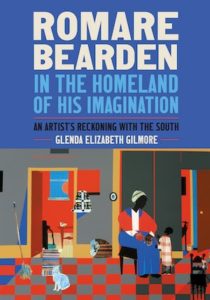“Romare Bearden in the Homeland of His Imagination: An Artist’s Reckoning with the South”
A book group especially for art enthusiasts.
February 16, 2023 12:00 pm - 1:00 pm At the Museum and virtually on Zoom
"Romare Bearden in the Homeland of His Imagination: An Artist’s Reckoning with the South" by Glenda Elizabeth Gilmore
Welcome to Museum Reads, the Newport Art Museum’s Art-Themed book group for adults. We meet monthly, at the Museum and virtually, for discussion, and frequently are joined by the author.
In honor of Black History Month and the current exhibition of Joseph Norman’s work, February’s Museum Reads book is a close look at the life and work of artist Romare Bearden.

Romare Bearden (1911–1988), one of the most prolific, original, and acclaimed American artists of the twentieth century, richly depicted scenes and figures rooted in the American South and the Black experience. Bearden hailed from North Carolina but was forced to relocate to the North when a white mob harassed his family in the 1910s. His family story is a compelling, complicated saga of Black middle-class achievement in the face of relentless waves of white supremacy. It is also a narrative of the generational trauma that slavery and racism inflicted over decades. But as Glenda Gilmore reveals in this trenchant reappraisal of Bearden’s life and art, his work reveals his deep imagination, extensive training, and rich knowledge of art history.
Gilmore explores four generations of Bearden’s family and highlights his experiences in North Carolina, Pittsburgh, and Harlem. She engages deeply with Bearden’s art and considers it as an alternative archive that offers a unique perspective on the history, memory, and collective imagination of Black southerners who migrated to the North. In doing so, she revises and deepens our appreciation of Bearden’s place in the artistic canon and our understanding of his relationship to southern, African American, and American cultural and social history.
Museum Reads Notes:
Be sure to register to receive email updates and Zoom links.
For last minute registrations, please call the front desk for the Zoom link at 401-848-8200.
Don’t miss!
Joseph Norman: Works from the Permanent Collection on view through April 16, 2023
About the Author

Glenda Elizabeth Gilmore is the Peter V. and C. Van Woodward Professor of History, African American Studies, and American Studies at Yale University. She earned her Ph.D. at the University of North Carolina at Chapel Hill. She is the editor of Who Were the Progressives? and co-edited Jumpin’ Jim Crow: Southern Politics from Civil War to Civil Rights. Her first book, Gender and Jim Crow: Women and the Politics of White Supremacy in North Carolina, 1896-1920, published in 1996, won the Frederick Jackson Turner Award, the James A. Rawley Prize, the Julia Cherry Spruill Prize, and the Heyman Prize.
Gilmore received fellowships from the American Council of Learned Societies and the Liguria Study Center in Bogliasco, Italy, in 2013-2014. She is a Fellow of the Society of American Historians, and has received fellowships from the Guggenheim Foundation, the National Humanities Center, the National Endowment for the Humanities, the Woodrow Wilson Foundation, the Center for Advanced Study in Visual Arts, and the Institute for Advanced Study at Radcliffe at Harvard University. She is a former president of the Southern Association for Women Historians. In 2015-2016, she won Yale’s Sidonie Miskimin Clauss ’75 Prize for Teaching Excellence in the Humanities. A recipient of Yale’s Graduate Mentoring Award, she has directed thirty-seven completed dissertations and served as a committee member for twenty-seven completed dissertations.
Gilmore offers graduate reading and research courses in 20th century political and social history, African American history after 1865, and the history of the South since 1865. She teaches undergraduate courses on African American history, the Progressive Era, and U.S. Political and Social History, 1900-1945. She is also on the faculty of African American Studies and American Studies.
This program is made possible by your support of the Annual Fund.